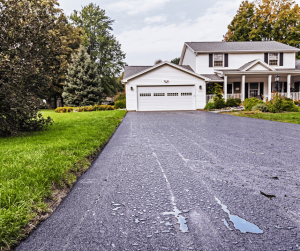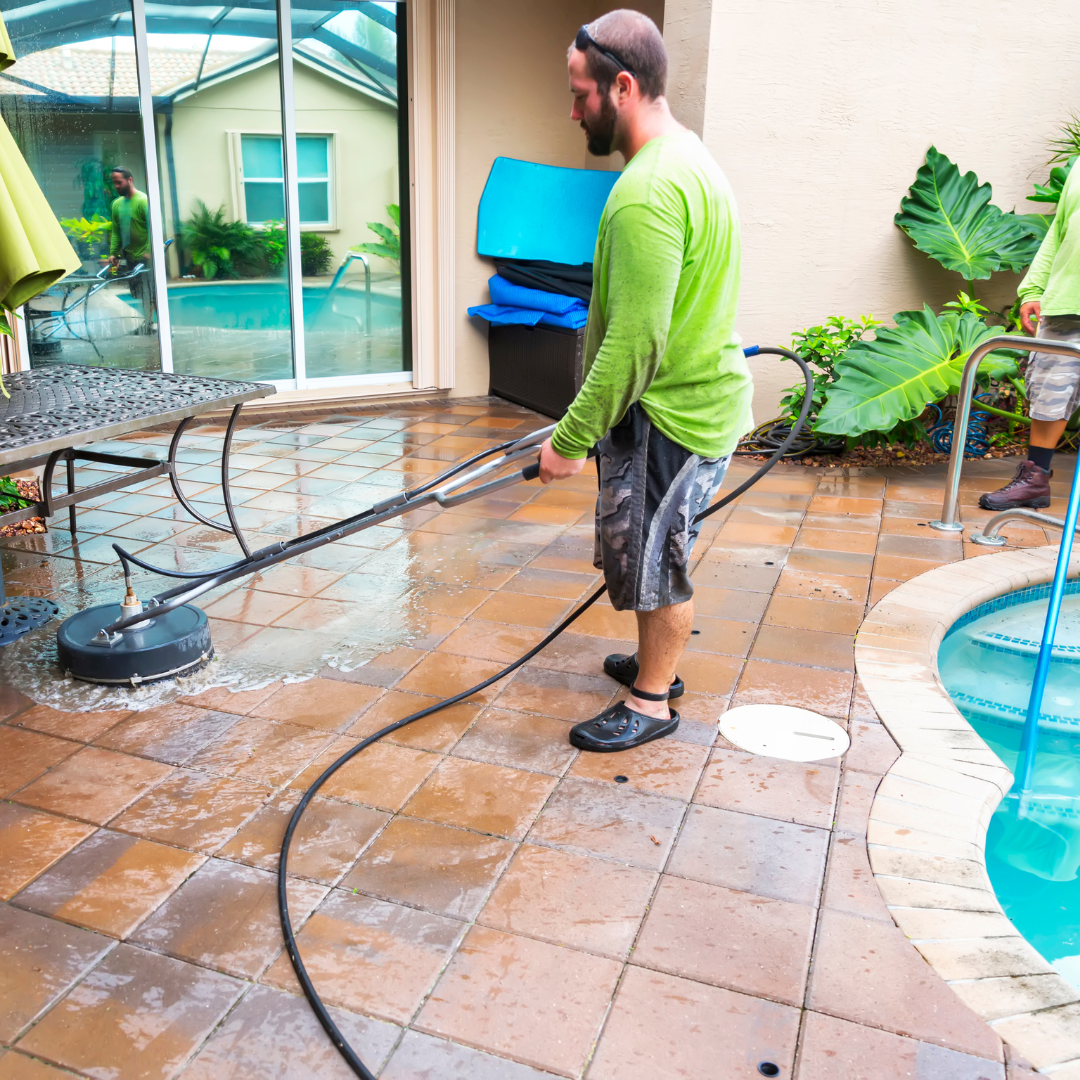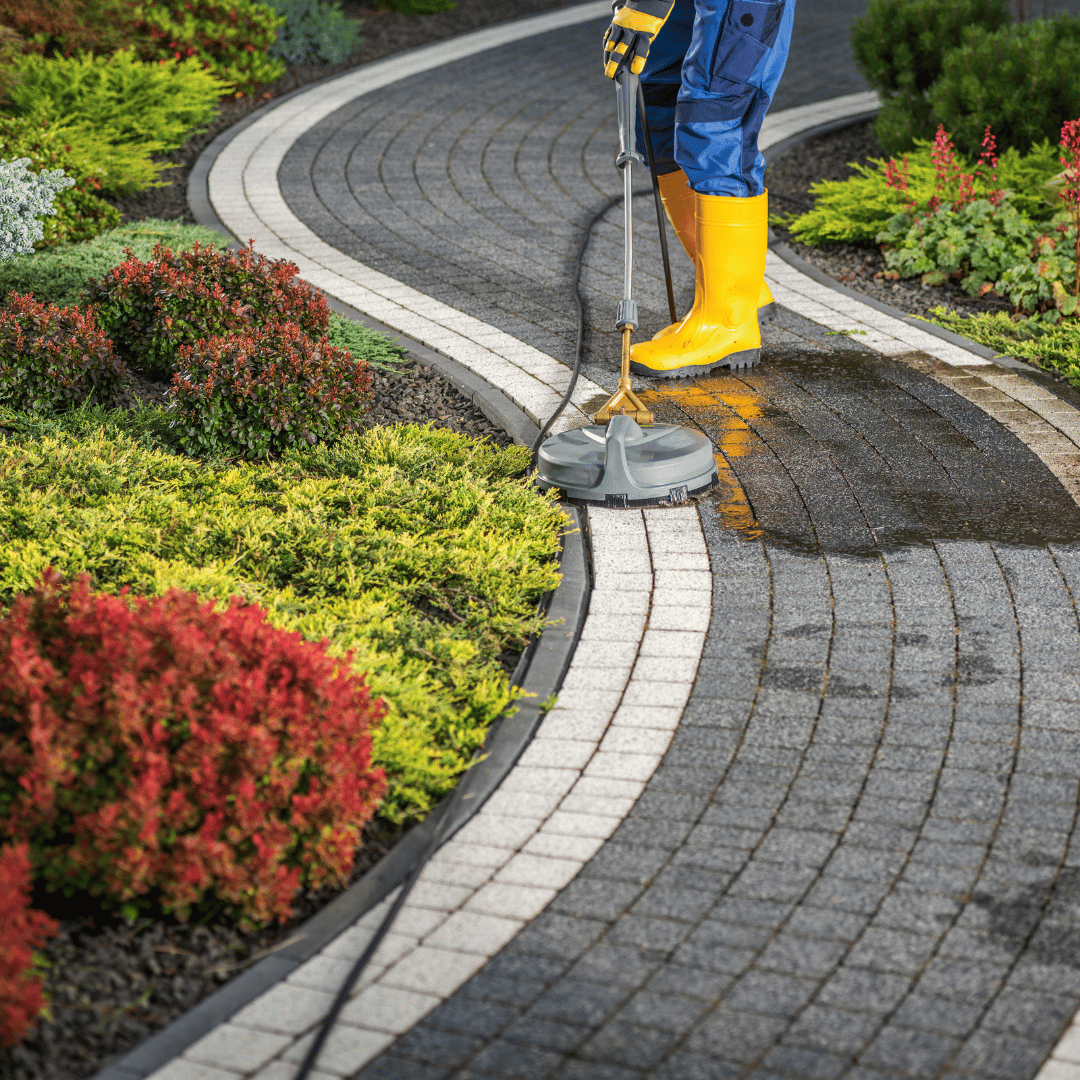
Tips, Solutions, and Techniques to Driveway and Sidewalk Cleaning
Keeping your driveway and sidewalk clean is essential for maintaining the overall appearance and functionality of your home. These exterior surfaces not only impact your home’s curb appeal but also play a critical role in ensuring safety and longevity. Regular cleaning helps prevent the buildup of dirt, grime, and stains, which can lead to more serious issues over time.
In this article, we’ll explore effective methods for driveway and sidewalk cleaning, answer common questions, and provide tips on maintaining these surfaces. Whether you’re considering Pressure Washing or other cleaning techniques, understanding the best practices will help you keep your home looking its best and functioning smoothly. This falls under the broader scope of Exterior Home Maintenance, which also includes tasks like Gutter Cleaning and Window Washing.
Let’s dive into how you can effectively clean and maintain your driveway and sidewalk, ensuring that your home remains both beautiful and well-kept.
How Do You Clean Sidewalks and Driveways?
Keeping your driveway and sidewalk clean can enhance your home’s curb appeal and prevent surface deterioration. Here’s a detailed guide on how to effectively clean these exterior areas:
Manual Cleaning Methods
1. Broom and Shovel
- Sweeping: Start by using a broom to remove loose debris such as leaves, dirt, and small stones. This helps clear the surface and makes the subsequent cleaning steps more effective.
- Shoveling: For larger debris or accumulated dirt, use a shovel to lift and remove the material from the surface. This is particularly useful for heavy, compacted debris.
2. Scrubbing
- Surface Scrubbing: For stubborn stains or grime, use a scrub brush and a mixture of water and mild detergent. Scrub the affected areas with circular motions to dislodge dirt and stains.
- Spot Treatment: For localized stains, such as oil or rust, apply a cleaner specifically designed for that type of stain. Let it sit for a few minutes before scrubbing.
Pressure Washing Techniques
1. Preparation
- Clear the Area: Remove any obstacles, furniture, or objects from the driveway and sidewalk. This ensures you can clean every part of the surface without obstruction.
- Pre-Rinse: Use a garden hose to rinse the area lightly. This helps remove loose dirt and prepares the surface for more thorough cleaning.
2. Pressure Washing
- Choosing the Right Nozzle: Use a pressure washer with an appropriate nozzle for the job. A 25-degree or 40-degree nozzle is generally suitable for concrete surfaces, while a 15-degree nozzle is better for tougher stains.
- Technique: Start washing from one end of the surface and work your way to the other. Keep the nozzle at a consistent distance from the surface (usually 6-12 inches) to avoid damaging the concrete. Use even strokes and avoid concentrating on one spot for too long.
By following these steps, you can effectively clean your driveway and sidewalk, ensuring they remain in good condition and look their best. Regular maintenance will help prevent the accumulation of grime and stains, contributing to the overall appearance and longevity of your home’s exterior surfaces.
Is It Worth Cleaning a Driveway?
Cleaning your driveway is more than just a matter of aesthetics; it has several practical benefits that make it a worthwhile task. Here’s why investing time and effort into cleaning your driveway is valuable:
Aesthetic Benefits
Enhanced Curb Appeal
- Visual Impact: A clean driveway significantly improves the overall appearance of your home. It creates a welcoming entrance and enhances your property’s curb appeal.
- Positive Impression: Whether you’re planning to sell your home or simply want to enjoy a tidy exterior, a well-maintained driveway makes a great first impression.
Functional Benefits
Prevention of Damage
- Surface Integrity: Regular cleaning helps prevent the buildup of substances that can cause damage, such as oil stains, mold, and mildew. These elements can deteriorate the concrete or asphalt over time, leading to costly repairs.
- Avoiding Cracks: Removing debris and stains reduces the risk of cracks and other surface issues that can arise from accumulated grime.
Increased Longevity
- Extended Lifespan: Keeping your driveway clean helps extend its lifespan. By addressing stains and grime promptly, you prevent deterioration and maintain the structural integrity of the surface.
- Reduced Maintenance Costs: Regular cleaning and maintenance can prevent more severe damage, ultimately reducing the need for expensive repairs or replacements.
Long-Term Value
Impact on Property Value
- Increased Market Value: A clean, well-maintained driveway can positively impact your property’s market value. Potential buyers are likely to appreciate a property that shows signs of regular upkeep.
- Competitive Edge: In a competitive real estate market, a clean driveway can set your property apart from others, potentially making it more appealing to prospective buyers.
In summary, cleaning your driveway is a valuable investment that enhances your home’s appearance, prevents damage, and contributes to its long-term value. Regular maintenance ensures that your driveway remains in excellent condition, benefiting both your immediate living environment and future property value.
What Is the Best Solution for Pressure Washing a Driveway?
When it comes to pressure washing your driveway, choosing the right cleaning solution can make a significant difference in the effectiveness of the cleaning process. Here’s a guide to selecting and using the best solutions for pressure washing:
Recommended Cleaning Solutions
Commercial Driveway Cleaners
- Pre-Mixed Solutions: These are specially formulated for concrete and asphalt driveways. They often contain powerful degreasers and detergents designed to break down stubborn stains like oil, grease, and grime.
- Specialty Products: Look for cleaners that target specific issues, such as rust or algae, if you have unique staining problems.
Homemade Solutions
- Dish Soap and Water: A simple mixture of dish soap and warm water can be effective for light cleaning. It helps to loosen dirt and grime from the surface.
- Vinegar and Baking Soda: For a natural alternative, combine vinegar and baking soda. This mixture is especially useful for breaking down organic stains like moss or algae.
Choosing the Right Solution
Surface Type
- Concrete: Use a cleaner that is strong enough to tackle tough stains but gentle enough to avoid damaging the surface. Concrete cleaners often have specific formulations to address different types of stains.
- Asphalt: Opt for a solution that is safe for asphalt, as some chemicals can degrade the material over time.
Stain Type
- Oil Stains: Use a degreaser or a cleaner specifically designed to tackle oil stains. Commercial products are usually more effective for heavy grease and oil.
- Organic Stains: For mold, mildew, or algae, use a solution with bleach or a specialized cleaner that targets these organic growths.
Application Tips
- Preparation: Before applying any cleaning solution, make sure the surface is pre-rinsed to remove loose debris. Follow the manufacturer’s instructions for mixing and applying the solution.
- Application: Apply the cleaner evenly across the surface. For tough stains, let the solution sit for a few minutes to allow it to penetrate and break down the grime.
- Rinsing: After the solution has had time to work, rinse the driveway thoroughly with a pressure washer or garden hose. Ensure all cleaning residues are washed away to avoid any potential damage.
By selecting the right cleaning solution and applying it correctly, you can achieve a thorough clean and maintain the pristine condition of your driveway. Regular use of appropriate solutions will help keep your driveway looking fresh and well-maintained.
What Do Professionals Use to Clean Concrete?
When it comes to effectively cleaning concrete surfaces, professionals often rely on specialized tools and techniques to achieve the best results. Here’s a closer look at what experts use for concrete cleaning:
Professional Tools and Equipment
Industrial Pressure Washers
- High-Pressure Units: Professionals use industrial-grade pressure washers that deliver higher pressure and flow rates compared to residential models. These units are capable of removing tough stains and deep-seated grime.
- Adjustable Pressure Settings: These machines allow for precise control of water pressure, making them suitable for various types of concrete surfaces and cleaning tasks.
Surface Cleaners
- Rotary Surface Cleaners: These are attachments for pressure washers that have a rotating brush or scrubber. They cover a larger area more efficiently and provide an even cleaning finish without streaks.
- Flat Surface Cleaners: Ideal for large, flat areas, these tools help maintain a consistent distance from the surface and reduce cleaning time.
Techniques Used by Experts
Pre-Treatment
- Pre-Application of Cleaner: Before pressure washing, professionals often apply a pre-treatment cleaner or degreaser to break down tough stains and grime. This step ensures that the pressure washing process is more effective.
- Allowing Dwell Time: The cleaner is left on the surface for a specified time to loosen dirt and stains, which helps achieve a deeper clean.
Pressure Washing
- Proper Nozzle Selection: Professionals choose the appropriate nozzle size and type based on the surface and type of cleaning needed. A wider nozzle is used for general cleaning, while a narrower nozzle targets tough stains.
- Technique: Experts use a consistent sweeping motion to avoid overlapping and to ensure that all areas are cleaned evenly. They also maintain a safe distance from the surface to prevent damage.
Post-Cleaning Seal
- Applying Sealant: After cleaning, professionals may apply a sealant to protect the concrete from future stains and damage. Sealants help repel water, oil, and dirt, extending the life of the concrete surface.
- Final Inspection: A thorough inspection is conducted to ensure that all areas are clean and to address any remaining issues.
By using advanced tools and techniques, professionals can achieve a high level of cleanliness and maintain the integrity of concrete surfaces. Their expertise ensures that driveways, sidewalks, and other concrete areas remain in top condition, contributing to the overall appearance and durability of your home.
What Is the Best Chemical to Clean Concrete Driveways?
Selecting the right chemical cleaner for your concrete driveway is crucial for effective cleaning and maintaining the integrity of the surface. Here’s a guide to the best chemicals for various types of stains and grime:
Types of Chemical Cleaners
Degreasers
- Purpose: Degreasers are specifically formulated to break down and remove oil and grease stains. They are essential for dealing with automotive spills or other greasy substances.
- Examples:
- Commercial Degreasers: Products like Simple Green or Krud Kutter are popular choices for heavy-duty grease removal.
- DIY Option: A mixture of dish soap and warm water can be used for lighter grease stains.
Alkaline Cleaners
- Purpose: These are general-purpose cleaners that work well on a variety of stains, including dirt and grime. They are effective in breaking down organic matter and are often used in combination with pressure washing.
- Examples:
- Commercial Alkaline Cleaners: Products such as Zep Concrete Cleaner or Heavy Duty Concrete Cleaner are effective and widely used.
- DIY Option: A mixture of baking soda and water can serve as a mild alkaline cleaner for less severe stains.
Acidic Cleaners
- Purpose: Acidic cleaners are designed for removing tough stains like rust or mineral deposits. They should be used cautiously, as they can be harsh on concrete surfaces.
- Examples:
- Commercial Acidic Cleaners: Muriatic acid is commonly used for heavy rust and mineral stains but must be diluted and handled with care.
- DIY Option: Vinegar can be used as a milder acidic cleaner for light rust stains or mineral buildup.
Mold and Mildew Cleaners
- Purpose: These cleaners are formulated to eliminate mold, mildew, and algae that can grow on concrete surfaces. They typically contain bleach or other antimicrobial agents.
- Examples:
- Commercial Mold Cleaners: Products like RMR-86 or Wet & Forget are designed to tackle mold and mildew effectively.
- DIY Option: A solution of bleach and water (1 part bleach to 10 parts water) can be used for treating mold and mildew.
Application Tips
Follow Manufacturer Instructions
- Always adhere to the instructions provided by the manufacturer for mixing and applying the cleaner. This ensures optimal results and minimizes the risk of damage.
Safety Precautions
- Protective Gear: Wear gloves, goggles, and a mask when handling strong chemicals to avoid skin irritation or inhalation of fumes.
- Ventilation: Ensure proper ventilation if using chemicals in enclosed areas to prevent the buildup of harmful fumes.
Testing
- Spot Test: Before applying any chemical cleaner to the entire driveway, perform a spot test on a small, inconspicuous area to ensure it does not cause damage or discoloration.
By choosing the right chemical cleaner and following proper application techniques, you can effectively remove stains and maintain the appearance of your concrete driveway. Regular cleaning and maintenance help preserve the driveway’s durability and enhance the overall look of your home’s exterior.
How Do You Clean Sidewalks and Driveways?
Cleaning sidewalks and driveways involves a series of steps to ensure thorough removal of dirt, stains, and grime. Here’s a detailed guide on how to effectively clean these surfaces:
Preparation
Clear the Area
- Remove Debris: Start by sweeping or using a leaf blower to remove loose debris, leaves, and dirt from the surface.
- Move Objects: Remove any obstacles, such as planters or outdoor furniture, that could obstruct your cleaning process.
Choose the Right Equipment
- Pressure Washer: Ideal for larger areas and tough stains, a pressure washer helps to clean more effectively and quickly.
- Broom or Brush: For manual cleaning, a stiff-bristled broom or scrub brush can help agitate dirt and grime.
Cleaning Process
Apply Cleaning Solution
- Commercial Cleaners: Use a pre-mixed concrete cleaner or degreaser based on the type of stain you’re targeting.
- Homemade Solutions: For a natural approach, a mixture of dish soap and water or vinegar and baking soda can be used.
Scrub the Surface
- Manual Scrubbing: For stubborn stains or smaller areas, scrub the surface with a brush to loosen dirt and grime. This is especially useful for areas that are not easily reached by a pressure washer.
- Pressure Washing: For larger areas, use a pressure washer to apply the cleaning solution. Adjust the pressure setting according to the type of surface and stains.
Rinse Thoroughly
- Pressure Washer: After applying the cleaner, use the pressure washer to rinse the surface thoroughly. This helps remove any residual cleaner and loosened grime.
- Hose and Water: If not using a pressure washer, rinse the area with a garden hose, ensuring all cleaning solution and debris are washed away.
Post-Cleaning
Inspect the Surface
- Check for Remaining Stains: After rinsing, inspect the area to identify any remaining stains or spots. If necessary, apply additional cleaner and scrub again.
- Final Rinse: Perform a final rinse to ensure all residues are removed.
Allow to Dry
- Drying Time: Let the surface air dry completely before replacing any moved objects or walking on it. This prevents re-soiling and allows any remaining moisture to evaporate.
Maintenance Tips
Regular Cleaning
- Frequency: Clean sidewalks and driveways regularly to prevent the buildup of grime and stains. Quarterly or bi-annual cleanings can help maintain their appearance.
- Preventative Measures: Apply a concrete sealer after cleaning to protect the surface from future stains and wear.
Address Stains Promptly
- Immediate Action: Address spills and stains as soon as they occur to prevent them from setting and becoming harder to remove.
By following these steps, you can effectively clean your sidewalks and driveways, enhancing their appearance and longevity. Regular maintenance not only keeps your outdoor spaces looking their best but also contributes to the overall curb appeal of your home.
Cleaning your driveway and sidewalk is an essential part of maintaining the exterior of your home. Whether you choose to tackle the task yourself or hire a professional, understanding the best practices and tools for the job can make a significant difference in the results.
By using the right cleaning solutions and techniques, such as pressure washing and proper chemical application, you can effectively remove stains and grime, restoring the appearance of your concrete surfaces. Regular maintenance and prompt attention to spills can further extend the life of your driveway and sidewalk, ensuring they remain in excellent condition.
Incorporating preventative home maintenance practices, such as regular cleaning and sealing, can save you from costly repairs down the line. At HomeSmiles, we emphasize the importance of maintaining both the interior and exterior home maintenance to keep your property in top shape. From gutter cleaning to window washing, our extensive 18-point service ensures that all those “honey-do” items are taken care of, giving you peace of mind and avoiding future issues.
By addressing the questions of how to clean sidewalks and driveways, what solutions and techniques are best, and understanding professional methods, you can achieve a cleaner, more inviting outdoor space. Keeping these surfaces well-maintained not only enhances the curb appeal of your home but also contributes to the overall safety and functionality of your property.
For thorough and effective driveway and sidewalk cleaning, consider incorporating these practices into your routine or seeking professional help from a trusted service provider like HomeSmiles.
- Protecting Your Property: Why the Right Cleaning Method Makes All the Difference
- The #1 Thing That’s Dulling Your Curb Appeal (And How to Fix It)
- How Maintenance Bundles Provide Peace of Mind for Busy Small Business Owners and Facility Managers
- Essential vs. Complete Home Packages: Choosing the Right Preventive Care for Your Property
- How a Simplified Service Model Benefits Both Homeowners and Franchisees Alike


